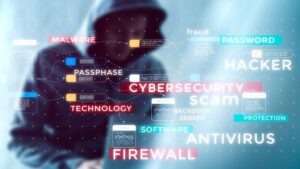
Importance of Cybersecurity Essentials
In today’s digital age, Cybersecurity essentials have become a critical aspect of any business. With the increasing amount of sensitive information being shared online, the threat of cyber-attacks has become more prevalent than ever before. Cybersecurity is not just about protecting sensitive data, it is also about protecting your reputation and ensuring that your business operations continue without disruption. In this article, we will discuss the essentials of cybersecurity and how you can protect your business from online threats.
Cybersecurity is the practice of protecting computer systems and networks from unauthorized access or attacks. As businesses become more reliant on technology, they face increasing risks from cyber threats. Cybersecurity is not just a concern for large corporations, small and medium-sized businesses are also at risk. Cyber attacks can have devastating consequences, including loss of data, financial loss, and damage to a company’s reputation. Therefore, it is essential for businesses to take cybersecurity seriously and implement appropriate measures to protect themselves.
What is Cybersecurity?
Cybersecurity refers to the process of protecting computer systems and networks from unauthorized access or attacks. It involves implementing measures to prevent, detect, and respond to cyber threats. Cybersecurity is essential for businesses to protect their data, systems, and networks from a range of threats, including malware, phishing, ransomware, and DDoS attacks.
Types of Cyber Threats

Malware
Malware is a type of software designed to damage or disable computer systems. Malware can take many forms, including viruses, trojans, and spyware. Malware can be spread through email attachments, malicious websites, or infected software.
Phishing
Phishing is a type of social engineering attack where attackers use fraudulent emails or messages to trick people into sharing sensitive information. Phishing attacks often masquerade as legitimate emails from reputable sources, such as banks or online retailers.
Ransomware
Ransomware is a type of malware that encrypts a victim’s files and demands a ransom in exchange for the decryption key. Ransomware attacks can be devastating for businesses, as they can result in the loss of sensitive data and financial loss.
DDoS Attacks
A Distributed Denial of Service (DDoS) attack is a type of attack that floods a network or website with traffic, making it unavailable to legitimate users. DDoS attacks are often carried out using a botnet, which is a network of compromised computers.
Common Cybersecurity Vulnerabilities
Businesses face a range of vulnerabilities that can be exploited by cyber attackers. Understanding these vulnerabilities is essential for businesses to implement appropriate measures to protect themselves.
Unpatched Software
Unpatched software refers to software that has not been updated with the latest security patches. Cyber attackers can exploit vulnerabilities in unpatched software to gain unauthorized access to a system or network.
Weak Passwords
Weak passwords are a common vulnerability that can be exploited by cyber attackers. Passwords that are easy to guess or crack can provide attackers with access to sensitive information.
Social Engineering
Social engineering is a type of attack where attackers use psychological manipulation to trick people into divulging sensitive information. Social engineering attacks can take many forms, including phishing, pretexting, and baiting.
Third-Party Risks
Third-party risks refer to the risks associated with working with third-party vendors, such as suppliers or contractors. Third-party vendors can provide attackers with a way to access a business’s systems and networks.
Cybersecurity Essentials Measures
To protect themselves from cyber threats, businesses need to implement a range of cybersecurity measures. The following are essential cybersecurity measures that businesses should implement.
Keep Software Up-to-Date
Keeping software up-to-date is essential for protecting against vulnerabilities. Software vendors regularly release security patches to address vulnerabilities, and it is important to apply these patches as soon as possible.
Strong Passwords
Using strong passwords is essential for protecting against password-related vulnerabilities. Passwords should be long, complex, and unique for each account. Passwords should also be changed regularly.
Employee Training
Employee training is essential for raising awareness about cybersecurity risks and best practices. Employees should be trained on how to identify and respond to cyber threats, as well as how to use company technology securely.
Data Backup and Recovery
Data backup and recovery is essential for ensuring that businesses can recover from a cyber attack. Regular backups should be taken and stored securely, and recovery procedures should be tested regularly.
Encryption
Encryption is the process of encoding data to make it unreadable without the correct decryption key. Encryption is essential for protecting sensitive information, particularly when it is being transmitted over the internet.
Firewall and Antivirus
A firewall is a network security system that monitors and controls incoming and outgoing network traffic. Antivirus software is designed to detect and remove malware. Implementing a firewall and antivirus software is essential for protecting against cyber threats.
Conclusion

In conclusion, cybersecurity is an essential aspect of our daily lives, as we increasingly rely on technology for our personal and professional activities. Understanding cybersecurity basics and implementing best practices can help us protect ourselves from digital threats, theft, and damage. By staying informed and taking necessary precautions, we can safeguard our online presence and maintain privacy and security in the digital world.






